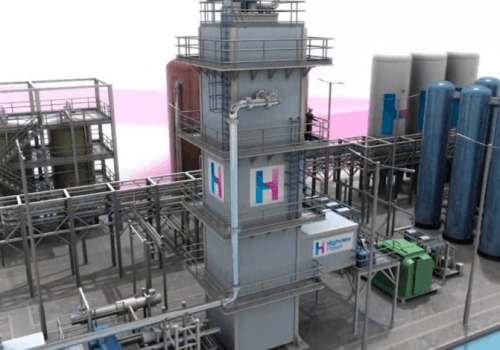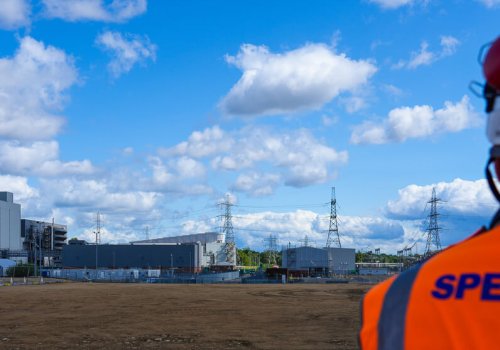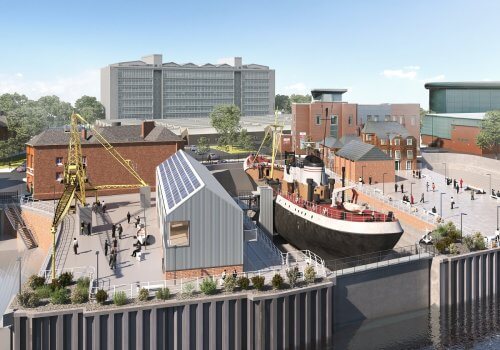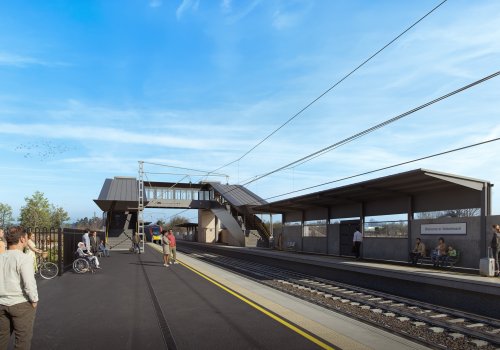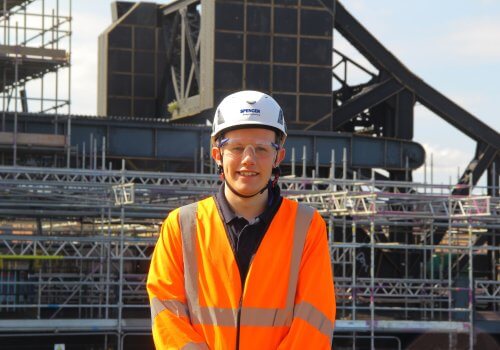Specialist engineering business Spencer Group has delivered the first project as part of a £150m investment in biomass handling operations at the Humber Ports.
Spencer Group has designed and constructed an impressive facility at the Port of Hull, showcasing the company’s multi-disciplinary engineering expertise in a field in which it is a UK leader.
The facility is the first to be completed to support a 15-year contract between port operator Associated British Ports (ABP) and Drax Power Limited to enable sustainable biomass to be transported to Drax Power Station at Selby, as part of an ambitious programme which will see Drax transform into a predominantly biomass-fuelled generator within a few years.
Work began in April 2013, with Spencer constructing biomass handling, storage and discharge facilities, as well as associated infrastructure.
Despite the complexities and challenges of the project, the facility became operational in time to play a part in a visit to Drax Power Station by Energy Secretary Ed Davey to officially open the new biomass facilities supporting the first generating unit converted to burn sustainable biomass in place of coal. The Energy Secretary saw Drax-branded rail wagons carrying biomass loaded at the Port of Hull facility arrive at the power station for delivery into the biomass converted unit.
The port facility has now been handed over by Spencer to ABP, the project having been delivered on programme and within budget.
The centrepiece of the development is a silo tower in a prominent position close to the main road from Hull’s docks. At 50 metres (164 feet) high it is one of the tallest structures on the city’s skyline.
The facility will handle a million tonnes a year of biomass imported by sea from the United States and Canada in the form of wood pellets created from sustainable forestry residues and thinnings. The biomass is stored in warehouses before being delivered by truck to the new facility and unloaded into feeders which take it to a 250-metre (820 ft) conveyor, carrying it to the top of the silo.
The silo is capable of storing up to 1,800 tonnes of wood pellets and is filled by 60 truckloads of biomass over a three-hour period, twice a day, loading at the rate of 600 tonnes an hour.
Sophisticated technology ensures an even load as the biomass is discharged into rail wagons which pass through the base of the structure at crawling speed. The automated system is capable of loading up to 30 rail wagons with 1,500 tonnes of material in just 45 minutes.
Gary Thornton, Chief Operating Officer of Hull-based Spencer Group said: “We are delighted to have met the expectations of our client, ABP, with the successful delivery of this complex and challenging project. It has employed our multi-disciplinary engineering expertise to best effect, with rail, civil, structural, electrical and mechanical engineers all involved.
“We are especially pleased to have worked so constructively with ABP and Drax on the first project to be delivered as part of the major investment being made in the Humber Ports to support the phased conversion of Drax to a predominantly biomass-fuelled generator.
“The Humber Ports are becoming a major gateway for biomass shipments into the UK and a strategic asset driving the growth of green energy industries along the estuary. The facility we have constructed at the Port of Hull is both a showcase for our engineering capability and a beacon for the Humber’s growing reputation as the UK’s renewables region.”
Philip Hudson, Drax Director of Corporate Affairs, said: “With its headquarters in Hull. Spencer Group was geographically well placed to take on the project, supported by a trusted and reliable local supply chain. Spencer also offered design and build expertise and the ability to mobilise and deliver the project rapidly to meet the requirements of Drax and ABP.
“The facility at the Port of Hull is an impressive feat of engineering, addressing successfully a number of operational challenges.”
Simon Brett, Head of Projects, Humber, for ABP, said: “Spencer has delivered a design and build project to meet the requirements of both ABP and Drax Power, in the transportation of biomass from the Port of Hull to Drax’s power station near Selby.
“The facility will be able to accommodate up to four trains per day, loading through a state-of-the-art system that complies with all environmental and safety standards.”
The Port of Hull facility reinforces Spencer Group’s reputation for pioneering projects in the green energy field. Flagship schemes have included designing and building a biomass reception, handling and storage facility at Drax Power Station in 2010 and, in the same year, a biomass rail-loading facility at the Port of Tyne, which was then the first of its kind in the world, again to serve Drax.
The port investments are generating about 100 jobs during construction, with an additional 100 jobs created once all the facilities become fully operational. The largest is an investment of around £125m in a dedicated import facility, the Immingham Renewable Fuels Terminal (IRFT), which is due to be completed later this year. IRFT will handle bulk carriers bringing up to three million tonnes of wood pellets a year into the port, destined for Drax Power Station.
The new facilitiesunderline the Humber’s reputation as the UK’s Energy Estuary, with a quarter of the country’s energy needs generated in the region, or supplied through it.
ABP is the UK’s leading ports operator. ABP’s Humber ports play a crucial role in delivering national energy security and are at the forefront of supporting Britain’s transition to low carbon and new renewable energy generation.


